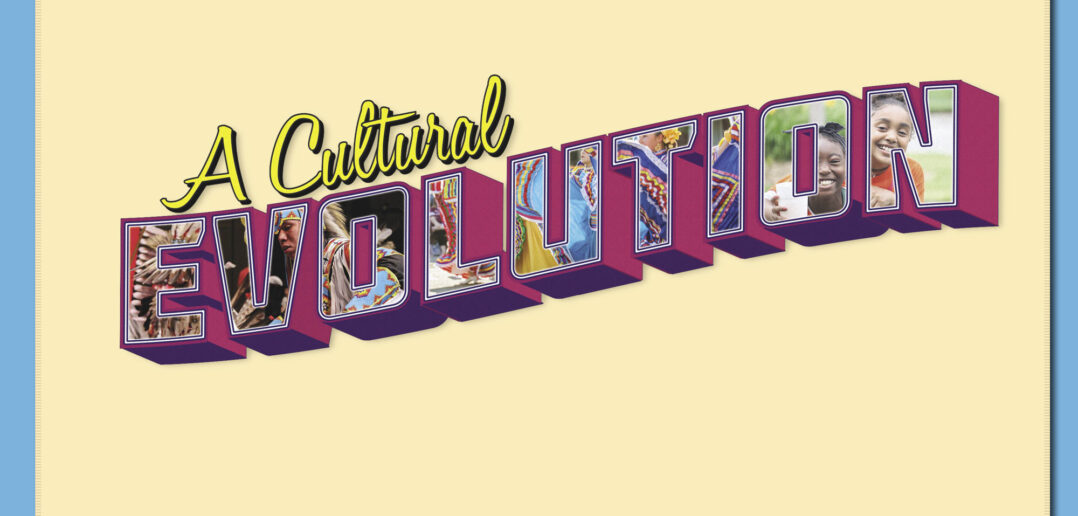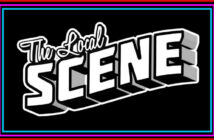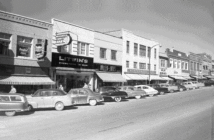| story by | |
| photos by | Steven Hertzog |
| OPEN A PDF OF THE ARTICLE |
In celebrating the rich history of Lawrence, be sure not to miss the numerous events that honor our community’s diverse cultures.
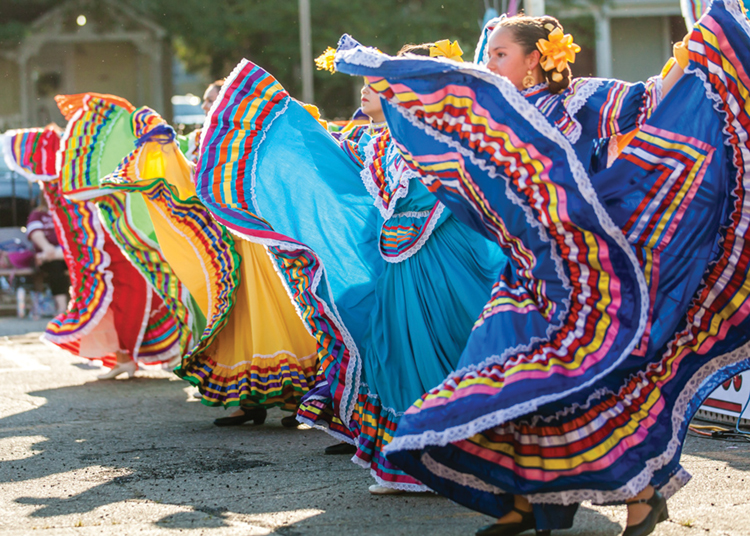
A Cultural Evolution
When thinking about how Lawrence has preserved so much of its important history while also evolving with the times, it is important to remember the many cultural events celebrated annually around town, including St. John’s Mexican Fiesta, the Juneteenth Festival and the University of Kansas (KU) Powwow and Indigenous Cultures Festival. Each of these events works to preserve important but sometimes overlooked aspects of Lawrence and American history, and each has evolved over time to make valuable contributions to the Lawrence community.
Fiesta Time
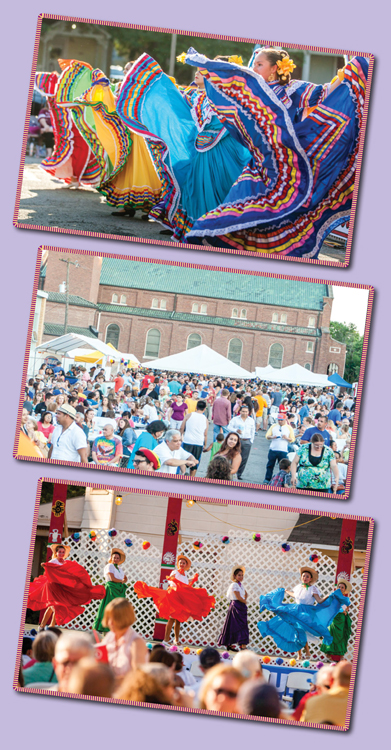
St. John’s Mexican Fiesta photos Courtesy of St. John the Evangelist Church
Maybe you’ve heard of La Yarda, the complex built in 1924 near 8th Street by Santa Fe Railroad to house its Mexican railway workers and their families. Working for the railroad was one way Mexican-Americans found their way to Lawrence, and many of them lived in La Yarda. It thrived until 1951, when the Kansas River flooded causing Lawrence’s Great Flood. Families scattered, and La Yarda was no more; but the community had established ties with St. John the Evangelist Catholic Parish and maintained that connection, creating a close Mexican-American community in town.
Recognizing its relationship with this community, in 1981, St. John’s asked its Mexican-American parishioners to host a mini fiesta to celebrate Mexican culture and raise funds for improvements around the grounds. The mini fiesta took place in the church basement, where food and music were provided for parishioners. This mini fiesta has, during the last 40 years, evolved into a two-day event that attracts attendees from all over Kansas each summer.
Today, St. John’s Mexican Fiesta consists of live mariachi bands, a DJ, dancers, including local children performing traditional Mexican dances, authentic Mexican foods and children’s games.
The fiesta is still a fund-raiser, using those funds primarily for the school’s Spanish language program and a scholarship fund to help local students of Mexican descent obtain college or trade school credits. In fact, the fiesta has provided over $43,000 in scholarships to local students through the years.
Though the fiesta was canceled the last two years because of the COVID-19 pandemic, it will be back the weekend after Father’s Day, 2022, on St. John’s blacktop, and everyone is welcome. As Frank Lemus, one of the fiesta’s organizers, notes: “This is a celebration for the whole city of Mexican-American culture in Lawrence. It is an opportunity for everyone to celebrate that culture, as well as to celebrate togetherness and stewardship.”
Celebrating Freedom
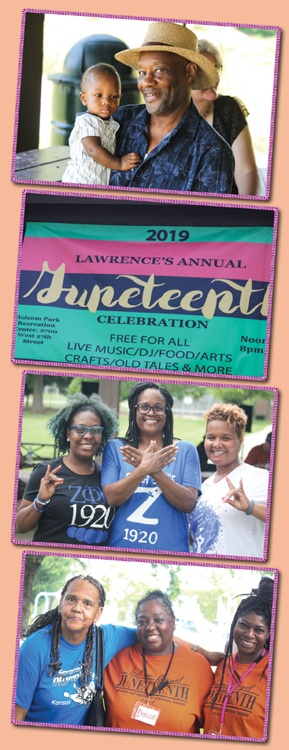
Juneteenth photos contributed by Juneteenth Celebration
On Sept. 22, 1862, President Abraham Lincoln signed the Emancipation Proclamation. This executive order freed all enslaved African Americans effective Jan. 1, 1863. Although slavery was officially outlawed, African Americans in Texas remained enslaved for an additional 2½ years before Union troops arrived to enforce the order.
Juneteenth, also known as “Jubilee Day” and” Freedom Day,” is the commemoration of June 19, 1865, the day Union Army Gen. Gordon Granger proclaimed enslaved African Americans in Texas free. Juneteenth celebrations in Texas began the next year, and they quickly spread across the south and then up north. Today, Juneteenth is celebrated in most major cities in the United States, and activists are campaigning for Congress to recognize it as a national holiday.
After attending a Juneteenth event in Arizona, Lawrencian Janine Colter, owner of Hidden Jewel Hair Salon and a professional licensed cosmetologist, realized that Lawrence, especially given its unique history as a free state, needed a similar celebration. So in 2003, Colter co-chaired with local resident Donna Bell in creating the initial committee that began an annual event to celebrate Black history in Lawrence.
That event evolved into Lawrence’s Juneteenth Festival, which includes oral presenters, Underground Railroad tours, three-on-three basketball tournaments, a prayer breakfast, an essay contest for school-aged children, live entertainment, music, food and a number of local vendors. As part of this celebration, in 2019, local children were able to go to City Hall and hear the Emancipation Proclamation read aloud. Adults were offered free diabetes and cholesterol checks by Heartland Community Health Center in an effort to gather, assist and inform African American citizens about health issues that affect them.
However, this family-friendly and educational event is not just for Lawrence’s African American community. It is an event created to entertain, support and inform all Lawrence residents. As Colter notes, “The Juneteenth celebration isn’t just about Black history; it’s about Lawrence history. We want everyone to come out, celebrate and learn with us.”
Be on the lookout for Juneteenth 2021. This year, it will take place beginning at noon on June 19 at South Park. There will be vendors, live music, food, presentations, speeches, a Kid Zone (run by the local Boys and Girls Club) and health services provided by Heartland Community Health.
A Cultural Salute
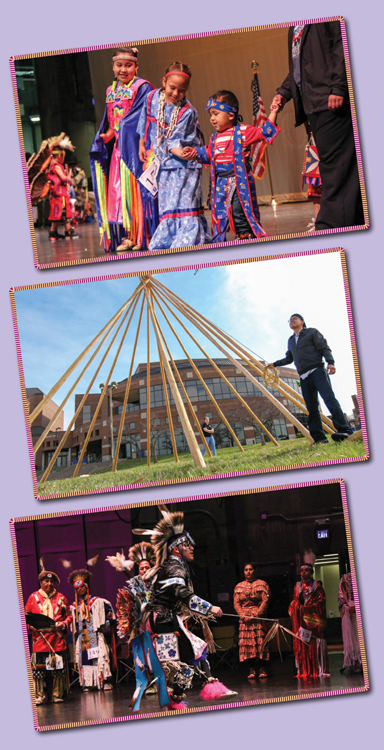
Lied Center Powwow and Indigenous Cultures; Festival photos by Laura Kingston
There is no denying that Lawrence has a unique, rich and complicated history when it comes to Native and non-Native relationships and issues. Yet this relationship between Lawrence and First Nations people and issues is also teeming with opportunities for greater community and understanding. KU’s First Nations Student Association (FNSA), which has held an annual powwow at the university for the past 30 years, recognized this potential when, in 2017, it decided to partner with the Lied Center to host the Powwow and Indigenous Cultures Festival. This event was meant to bring the community together in celebration and discovery, with the hope of building new, healthier and more positive relationships among Native and non-Native people in Lawrence. KU Powwow and Indigenous Cultures Festival organizing committee member Melissa Peterson says, “We work to create a community event that showcases the diversity and cultural depth of Indigenous peoples of North America, historically and in the contemporary, and host an event centered on learning, fun and respectful engagement while expanding and strengthening relationships between KU, the Lawrence community and Indigenous communities in our region.” This commitment to strengthening relationships is exemplified in the diversity of the hard-working committee responsible for putting this fantastic event together. KU Native faculty, students and staff, KU non-Native staff, Haskell staff and community members all work together to organize the KU Powwow and Indigenous Cultures Festival.
Modern powwows are opportunities for First Nations people and others to meet and socialize, dance, sing, eat and honor Native cultures, and the KU Powwow and Indigenous Cultures Festival is no exception. Anthea Scouffas, another member of KU Powwow and Indigenous Cultures Festival organizing committee, notes, “We have Native dancers from all over the U.S. who take part in the powwow. Local and regional Native artisans showcase and sell their work, and a number of local Native food vendors sell food and beverages just outside the Lied Center main doors. We also have many kids’ activities outside, some in the FNSA tepee and others throughout the grassy areas around the Lied.”
Past educational offerings have included: a panel on Indigenous language revitalization programs; a class called Powwow 101; a viewing of documentary films and panels; dwelling builds to showcase the diversity in traditional Native housing; an Indigenous Short Films Festival, “Identity by Design,” which showcased KU Native student’s regalia and tribal history; a performance by Native hip-hop artist/activist, Nataanii Means; a screening of “MEKKO” by writer/director Sterlin Harjo; and a live painting by muralist Steven Grounds. Some of the children’s programs have included: children’s literacy and crafts with the CRELI (Culturally Responsive Early Literacy Instruction) grant at KU, Haskell Alaska Club’s traditional dance activity and Haskell’s American Indian Higher Education Consortium Club’s demonstration of traditional Native hand games.
Because of the COVID-19 pandemic, this year’s events will be virtual. However, do not let this discourage you from attending. There are a number of fantastic and engaging events to join, including:
- a virtual 5k run/walk hosted by FNSA that will raise money to support a scholarship fund for First Nations students at KU
- a virtual Indigenous cooking class
- a documentary showing of “Sisters Rising: Native Women Reclaiming Sovereignty,” with a phenomenal panel discussion
- Indigenous storytelling and activities for children and adults
- the FNSA Virtual Powwow that will include educational information on different dances at a powwow.
![]()

